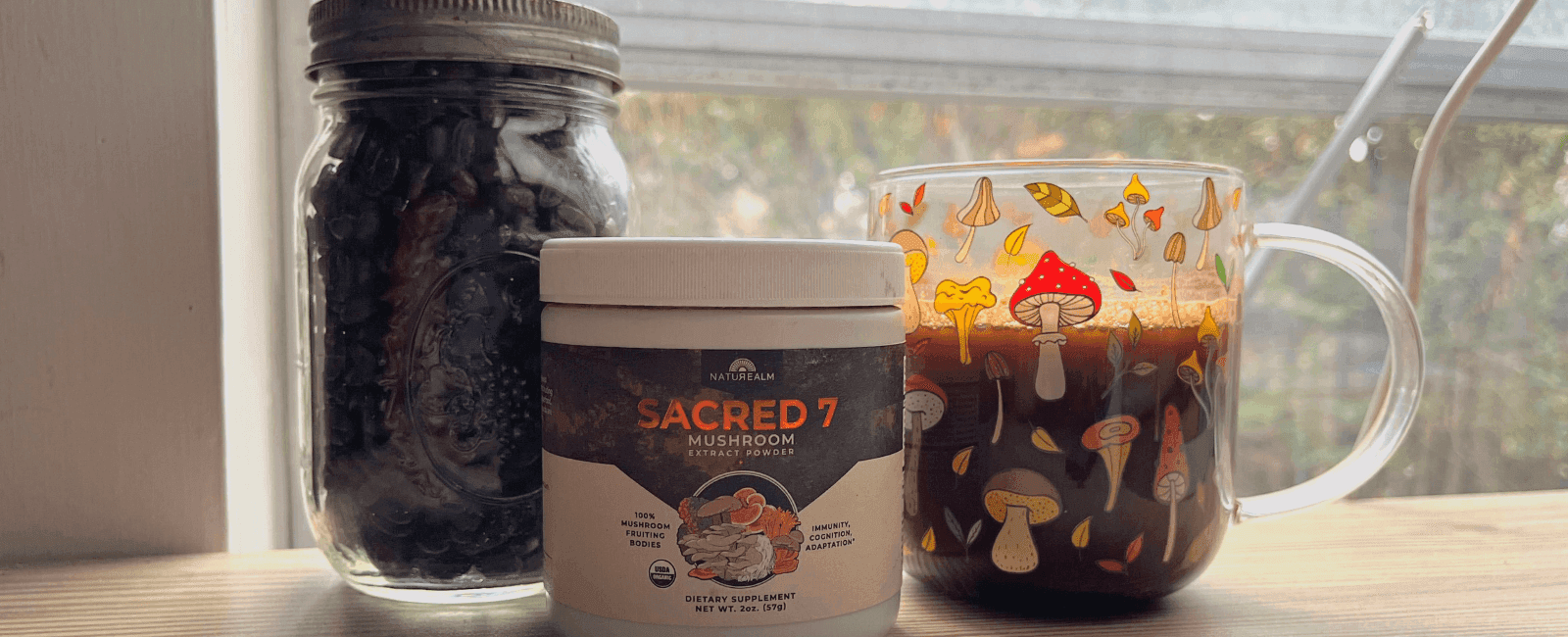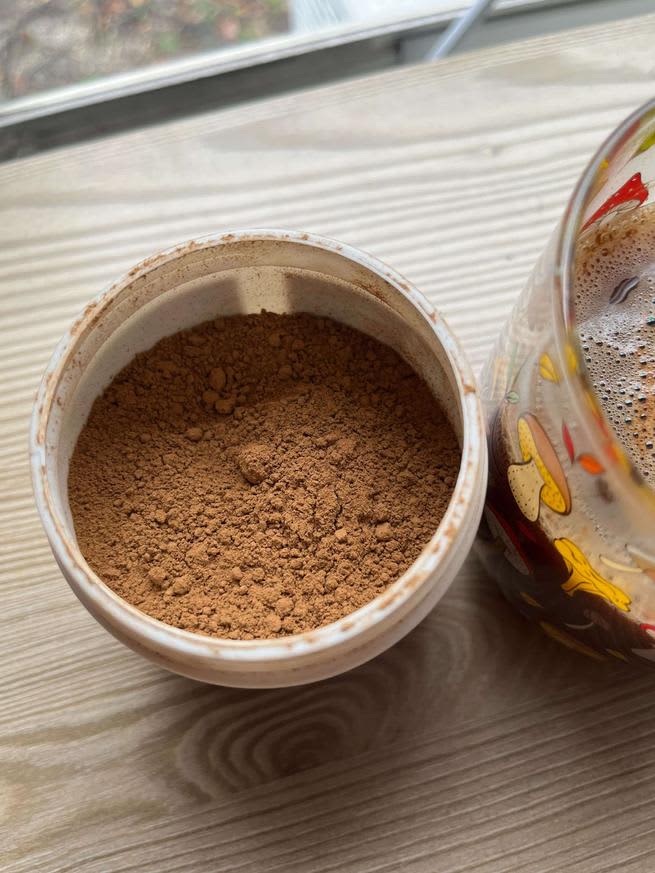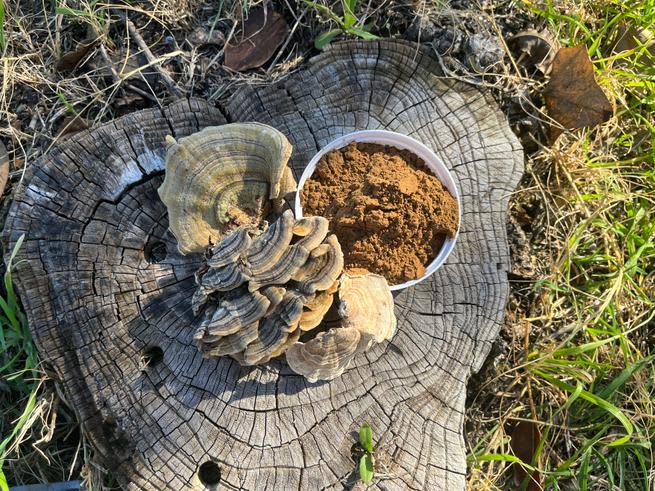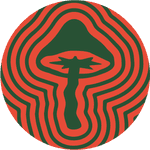

Adaptogenic beverages are roaring through wellness spaces and cafés, but what are these new drinks, and what are their benefits? If you’re a fungi fanatic or casual curious who’s interested in learning about mushroom coffee, we’ll break it down for you.
What is mushroom coffee?

Simply put, mushroom coffee is a drink made by combining coffee — either preground beans or a just brewed beverage — with dried, powdered mushroom extract.
Sometimes, folks make their shroom coffee by adding a liquid supplement to their java. Some companies sell an all-in-one package.
Mushroom coffee is marketed for its potential health benefits, including increased energy, enhanced immunity, added focus, and reduced stress and inflammation. It can even reduce the caffeine content of your morning cup.
Ingredients and composition
The java part of this drink typically consists of an instant coffee blend mixed with powdered functional mushrooms. The ratio of coffee to fungi ranges by brand, as do the exact type of mushrooms used.
Some mushroom coffee brands also add natural sweeteners, like dates, figs, or agave. Your shroomy cup of joe might have flavors like vanilla or cinnamon and may also include superfood components like cacao, enhancing the taste and nutritional profile.
Occasionally, products advertised as mushroom coffee may include these flavor add-ons while leaving coffee beans out of the mix. These varieties flex as replacements for your daily cup of coffee.
The common types of mushrooms used
Alternative approaches like traditional Chinese medicine have long revered certain fungi for their positive side effects, but regard for medicinal mushrooms in Western circles is more recent.
Some functional mushrooms have more benefits than others, and these are the types of mushrooms you’re most likely to see in your coffee. Think chaga, maitake, cordyceps mushrooms, lion’s mane, turkey’s tail, and reishi mushrooms.
As Healthline summarizes, various studies suggest that the adaptogen compounds within these mushrooms can aid multiple health conditions.
Still, there’s a lot of human research to be done — especially in direct relation to mushroom coffee.
The comparison to traditional coffee
Whether you’re hoping to reduce jitters with less caffeine in the morning or reap the potential benefits of fungi in your cup of joe, you’ll be happy to know that mushroom coffee is very similar to standard java.
“Interestingly enough, mushroom coffee tastes pretty similar to regular coffee,” registered dietitian Ryanne Lachman told the Cleveland Clinic. “It is, after all, coffee with mushroom extracts blended in.”
Mushroom powder by itself can have a range of tastes. It may be subtle and earthy, other times toasty or even bitter. Combined with the nuance of roasted beans, this can complement or balance the flavor of black coffee.
If you’re blending your own powder with already brewed coffee or ground beans, you can always adjust the amount of supplement, creamer, or sugar to get the desired taste.
Some prepacked blends have little to no ground coffee, giving more room for shroom supplements. In this case, you might even find mushroom coffee less acidic than your normal café order. Plus, the loamy notes of mushrooms can bring a smoother, richer mouthfeel to your latte.
The history of mushroom coffee
As mentioned earlier, the trend of incorporating the potential health benefits of mushrooms into coffee has gained popularity in recent years. But, the exact origin of this specific functional drink is unclear.
Sources attribute the concept of “herbal coffee” to Asian and non-Western civilizations employing mushrooms for medicinal purposes.
These drinks may or may not have used coffee but instead a blend of plants and shrooms for something similar to mushroom tea.
Per WebMD, “Experts call these wellness tools ’adaptogens.’ They’re thought to be able to help us adapt and survive in tense situations.” And the commercial history of mushroom coffee relates to survival in a few ways.
Food52 credits modern wellness brands like Four Sigmatic with popularizing the trend in current times. Four Sigmatic’s founder, Tero Isokauppila, told the publication: “Finnish people used chaga mushroom, native to our country, as a coffee substitute during World War II … To our knowledge, our grandparents invented the concept of using chaga as a coffee substitute.”
During the 1940s, the war made coffee and sugar scarce around Finland. However, they developed a coffee alternative from a blend of roasted ryegrass and chaga mushrooms steeped in hot water.
During wartime, this beverage leveraged chaga as the base. In our current version of the drink, fungi are more of an addition, with coffee making the bulk. It remains to be verified if the Finnish people actually invented the concoction — especially considering the traditions non-European cultures have had around medicinal mushrooms for centuries.
Health benefits of mushroom coffee

Why drink it?
Adding mushroom coffee to your wellness routine can offer many potential health benefits, including energy levels, heart health, and focus.
We all love the rush that caffeine delivers, but what if your coffee could also make you mentally sharper? Scientific analyses suggest a potential for some varieties of fungi, like lion’s mane mushrooms, to foster pointed focus and improved cognitive faculties (1).
Research in the Journal of Traditional and Complementary Medicine suggests that “ongoing studies show that selected mushrooms do have neurotrophic properties that can be beneficial to humans. Regular consumption may promote nerve and brain health” (2).
The publication does note that further research is needed.
Similar studies in Food Chemistry promote the biochemical compounds contained within mushrooms as anti-inflammatories, asserting that they may also help the body regulate cortisol. This hormone aids our biological response to stress, and since inflammation and stress can challenge the body’s immune systems, mushroom coffee can assist in strengthening it!
When to drink mushroom java
With that evidence in mind, the best time to drink mushroom coffee is pretty much any time of the day. For example, a blend heavy in lion’s mane would be a strong contender for your morning cup, afternoon pick-me-up, or even a gym pre-workout where you’re trying to get in the zone.
Additionally, mushroom coffee can be an excellent swap for any time you’d consider having a traditional coffee. Healthline notes that most mushroom coffees have less caffeine, so this beverage is perfect for a burst without the jitters.
Who drinks it?
Mushroom coffee isn’t just for your fungi-focused friend.
Anyone interested in a caffeine alternative but loves the taste of coffee can enjoy this health-boosted beverage — as are those looking for a drink that provides multifaceted benefits.
Additionally, those who are into fitness and athletics may find a particular advantage in mushroom coffee blends — especially those rich in cordyceps. The Journal of Dietary Supplements posits research that shows cordyceps can improve blood flow and enhance the body’s usage of oxygen, reducing fatigue and athletic stress (3).
How to make mushroom coffee

Preparing the mushrooms
Mushroom coffee is often made with dried fruiting bodies that are ground into powder and mixed into your coffee. You could also add some drops of tincture to your cup of coffee for a less thick consistency. A good tincture undergoes one or more extraction processes. The adaptogenic compounds are pulled by soaking in an alcohol solution, hot water, or both.
Commercial grower Cascadia Mushrooms notes that you can make your own blend by dehydrating your own mushrooms or grinding a batch of pre-dried fungi.
Brewing methods
Mushroom coffee is most commonly made in two ways: by brewing a pre-ratioed blend of ground beans and powdered supplement or by adding powdered mushrooms (or tincture) to your already brewed café.
That said, you can brew mushroom coffee through any method you would usually use for your daily cup. With a percolator or a press, a drip pot, or a pour-over — even with the same filters you’d use for your regular coffee-making process.
Recipe suggestions

Image Source: Tiffany Le for Bakerita
If you’re adding powder after brewing your coffee, you may need a few tries to get the flavor you want. These recipes will help you make a great cup of adaptogenic awesomeness:
1. Three ways to make mushroom coffee
Here’s a great way to get started on your mushroom brewing. Everyone likes to make their morning cup a little different. That’s great because there is a method for every individual preference out there!
This guide from Defiant Coffee gives you the basic know-how to make shroom java via French press, percolators, pour-overs, and AeroPress.
2. DIY mushroom coffee
Let’s say you already have a mushroom supplement of choice. You’re interested in making mushroom coffee but not in springing for a new, expensive product. No worries!
Freshcap offers a quick guide on making your own at-home shroom coffee with only the supplies you have on hand. Along with basic ratio suggestions, they provide an advanced recipe with a few tasty enhancers. Don’t forget to tip the barista.
3. Mushroom coffee mocha recipe
Once you have the basics of various crafting methods on lock, you can experiment with different mushroom coffee flavors and styles of coffee. Love a hot mocha when you hit the café? There’s a shroomy cuppa joe for that.
Since the recipe calls for a blender, you could even turn this into a smoothie by adding in some ice or frozen cubes of coffee.
Where to find mushroom coffee
Now that the adaptogenic value of mushrooms is catching on, you can find them everywhere.
When purchasing, follow the same rule you would with considering mushroom supplements. Look for 100% fruiting body extracts and avoid “full spectrum products.”
Online retailers

Because of the scale of companies like Four Sigmatic, it’s now a breeze to order these products from Whole Foods, Amazon, and even Walmart. Even coffee subscription sites like Bottomless now offer mushroom coffee subscriptions.
Popular brands such as Naturealm, Mud/Wtr, and Daily Harvest ship the powdered beverage directly to consumers. You also can buy from brands offering cold brew and iced coffee products, such as Califa Farms, Taika, and Earth & Star.
Specialty shops
Wellness stores and greengrocers are always great places to find mushroom coffee. The one thing to note here is that because of the nature of retail inventory, sometimes specialty brick-and-mortar stores have fewer options than what you’d find online.
No matter when you prefer to have a cup, mushroom coffee is a great way to add a bit more oomph. They say the best way to eat a nutritious diet is to drink some of your vegetables — now you can slurp your shrooms as well.
References
- Lai, Puei-Lene, Murali Naidu, Vikineswary Sabaratnam, Kah-Hui Wong, Rosie Pamela David, Umah Rani Kuppusamy, Noorlidah Abdullah, and Sri Nurestri A. Malek. 2013. “Neurotrophic Properties of the Lion’s Mane Medicinal Mushroom, Hericium Erinaceus (Higher Basidiomycetes) from Malaysia.” International Journal of Medicinal Mushrooms 15 (6): 539–54. https://doi.org/10.1615/intjmedmushr.v15.i6.30.
- Sabaratnam, Vikineswary, Wong Kah-Hui, Murali Naidu, and Pamela Rosie David. 2013. “Neuronal Health – Can Culinary and Medicinal Mushrooms Help?” Journal of Traditional and Complementary Medicine 3 (1): 62–68. https://doi.org/10.4103/2225-4110.106549.
- Hirsch, Katie R., Abbie E. Smith-Ryan, Erica J. Roelofs, Eric T. Trexler, and Meredith G. Mock. 2016. “Cordyceps MilitarisImproves Tolerance to High-Intensity Exercise after Acute and Chronic Supplementation.” Journal of Dietary Supplements 14 (1): 42–53. https://doi.org/10.1080/19390211.2016.1203386.


